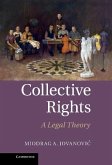In recent decades international and regional human rights norms have been increasingly applied to constitutional provisions, revealing significant tensions between primary political arrangements, such as power-sharing institutions, and human rights norms. This book argues that these tensions, generally framed as a peace versus justice dilemma, are built on an individualistic conception of justice that fails to account for the empirical reality in places characterized by ethnically based political exclusion and inequalities. By introducing the concept of 'Collective Equality' as a new theoretical basis for the law of peace, this timely book proposes a new approach for dealing with the tensions between peace-related arrangements and human rights norms. Through principled, pragmatic, and legal reasoning the book develops a new paradigm that captures more accurately what equality and human rights mean and require in the context of ethno-national conflicts, and provides potent guidance for advancing justice and peace in such places.
Dieser Download kann aus rechtlichen Gründen nur mit Rechnungsadresse in A, B, BG, CY, CZ, D, DK, EW, E, FIN, F, GR, HR, H, IRL, I, LT, L, LR, M, NL, PL, P, R, S, SLO, SK ausgeliefert werden.









